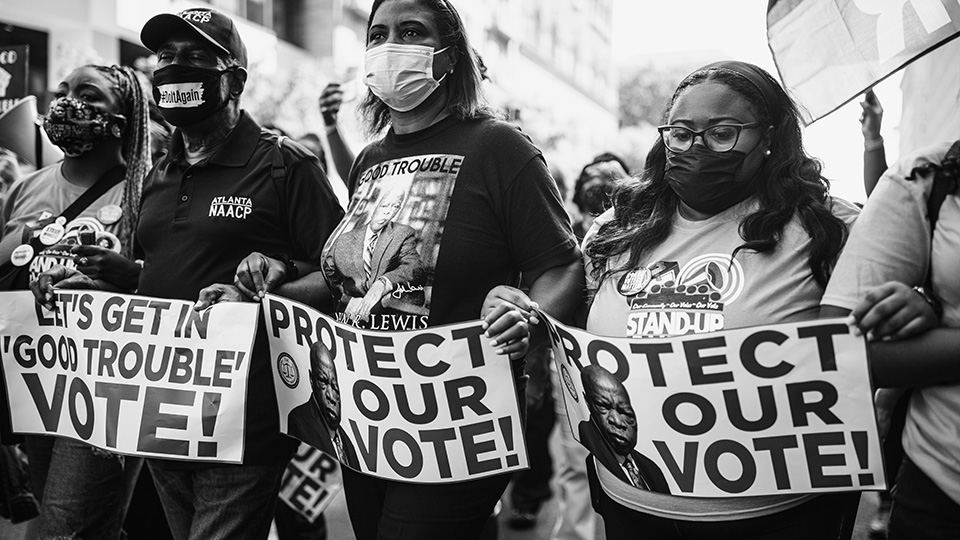Black History Month is about celebrating history makers past and present, recognizing gains made and acknowledging the work yet to be done.
In that spirit, Northwestern Now spoke with scholars to discuss the ongoing struggle over voting rights, successful inroads made by Black women in journalism and law, as well as talking to children about race.
Struggling to secure franchise rights
“Dr. Carter G. Woodson, the founder of Black History Month, envisioned that a focus on Black history would teach all Americans to ‘aspire to equality and justice’ for everyone in the U.S,” said Alvin Tillery Jr., an associate professor of political science and director of the Center for the Study of Diversity and Democracy.
“This was so in Dr. Woodson’s reckoning because Black Americans had made enormous contributions to the development of American democracy, even when they themselves could not claim the benefits of full citizenship rights and participation in the nation’s institutions and economy. Dr. Woodson’s vision was in many ways an animating theme of the Civil Rights Movement of the 1950s and 1960s, as Black men and women who fought as young people to preserve democracy in Europe and Asia during World War II and the Korean War rallied to the calls of Fannie Lou Hamer, Dr. King, Daisy Bates, and A. Philip Randolph to demand changes in American society that would finally make them fully equal at home.
Many elites in the Republican Party and conservative movement have been working to undermine access to the ballot for minority communities since the day [the Voting Rights Act] passed. ”
“No other goal was more important in this movement than securing the franchise rights that had been promised to them 90 years earlier with the passage of the 15th Amendment. What we have learned since the passage of the Voting Rights Act in 1965 is that all Americans have not embraced Dr. Woodson’s vision. On the contrary, instead of embracing the fact that the Voting Rights Act finally made America a full multi-racial democracy, many elites in the Republican Party and conservative movement have been working to undermine access to the ballot for minority communities since the day it passed.
“We must remember this fact as we ramp up efforts to preserve ballot access for African Americans and other people of color. When we reflect on how the Voting Rights Act was twice reauthorized with broad bipartisan support, we must remember that even during this time Republican-backed lawyers were working to undermine its effects through the judicial system. Indeed, when the Roberts Court struck down the Section 4(b) of the Voting Rights Act in 2013, it was the culmination of a 50-year legal campaign to undermine the law.
“This is a sobering reality that Black people are well aware of and are now organizing to combat. This point must be made over and over again to the allies of BIPOC communities as they wrestle with the question of what they can do to help preserve America’s multiracial democracy.”
Black women making news
“Despite this country’s ongoing fight against racism, there’s much to celebrate this 2022 Black History Month. We should lift up the Black women who are making news in the legal arena and in the journalism field,” said Ava Thompson Greenwell, a broadcast journalism professor at Medill, author of “Ladies Leading: The Black Women Who Control Television News” and director of the documentary “Mandela in Chicago.”
“President Biden announced he will nominate a Black woman to the highest court in the U.S. There’s a deep pool of exceptionally talented individuals from which he can choose. And oh, let’s not forget New York Attorney General Letitia James, who is leading the civil investigation into the business dealings of former President Donald Trump.
“Black women have reached some of the highest ranks possible in journalism. Kimberly Godwin is president of ABC News. Rashida Jones is president of MSNBC News, Daisy Veerasingham is president and CEO at The Associated Press and Lisa Matthews is only the second Black woman to lead The National Press Club, an organization steeped in white supremacy.
“These women’s ascension to top positions signals a shift to a new generation of influential Black women who have the potential to impact our country in new and better ways.
“Pioneering investigative journalist and anti-lynching activist Ida B. Wells-Barnett would be proud. Wells-Barnett is now one of the few women (regardless of race) to have a street named after her and a statue dedicated to her.
“So, despite any anti-Black rhetoric that might continue to divide, progress is being made. I imagine Ida B. Wells looking down with at least half of a smile and perhaps saying, “Yes, I know we still have a long way to go, but look how far we’ve come.”
History as a corrective
Janet Dees is the Steven and Lisa Munster Tananbaum Curator of Modern and Contemporary Art at The Block Museum of Art. And she quotes Lonnie Bunch: “Americans in some ways want to romanticize history. They want selective history. As the great John Hope Franklin used to say, you need to use African American history as a corrective, to help people understand the fullness, the complexity, the nuance of their history.”
Talking with your child early
“In our research we have found white parents choose to take a passive approach to conversations about race, simply waiting for their child to bring it up,” said Sylvia Perry, associate professor of psychology at Weinberg College of Arts and Sciences, a faculty fellow at the Institute for Policy Research and a faculty affiliate with the Institute for Sexual and Gender Minority Health and Wellbeing at Northwestern.
“Just because you haven’t heard your child say anything prejudiced does not mean that those attitudes are not forming. Children are not immune to the daily signals that they are observing in the world that indicate that some children are to be valued over others.
“If your child can have a conversation with you, they are old enough to start having conversations about race. As early as preschool, children start showing racial group favoritism.
“If children are exposed to prejudiced information through social media, their peers or the classroom, parents can counter that narrative by talking to their children about the history of and existence of racism within this country, the social construction of race, and the systemic biases that contribute to racial inequality.”


